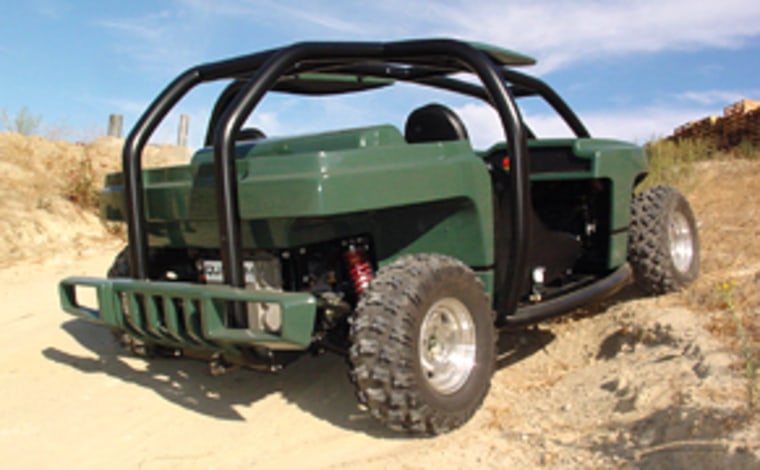Suppose you could build an off-road vehicle that's twice as quick as traditional ones, operates silently and can even be used as a generator. Sounds like an ultimate driving machine for the U.S. soldiers sneaking around battle zones, no?
Well, that's what a company has built as an Army concept vehicle. Nicknamed the Aggressor, the all-terrain vehicle runs on hydrogen and a fuel cell stack, which takes the hydrogen and outside air to create electricity.
So instead of a noisy diesel or gasoline power, the vehicle runs quietly on electricity. The fuel cell stack also emits less heat than an internal combustion engine, leaving a smaller heat signature for enemies to pick up. And the stack works as a silent power generator, so troops can run communications and surveillance equipment.
Performance over cost
While high costs mean hydrogen-powered, fuel cell cars are years away for regular consumers, the U.S. military is less concerned about money than it is about performance.
Quantum Fuel Systems, an Irvine, Calif., company that built the Aggressor under contract for the Army's vehicle engineering center, showed it off this week at an Army conference in Washington.
According to Quantum, the vehicle's top speed is 75 mph and it can reach 40 mph twice as fast as a gasoline peer. The Aggressor gets extra torque by using a battery pack that captures energy from braking. That's the same principle that's used in gas-electric hybrids sold to consumers.
But the Aggressor suffers from the same limitation that automakers are dealing with: the fact that it's hard to store much hydrogen on board. Quantum didn't provide the vehicle's range, but said it holds the equivalent of just 1.6 gallons of hydrogen. At best, that would translate into a range well under 100 miles.
Army sees 'real solutions'
Still, the director of the Army's engineering center called the Aggressor "a model for more efficient, high performance stealth vehicles."
"The vehicle has an integrated power plant, which provides more functionality for our soldiers," Dennis Wend added in a statement announcing the Aggressor. "What we've learned from this project definitely has the potential to translate into real solutions to give our soldiers an advantage."
Quantum CEO Alan Niedzwiecki pitched the Aggressor as also being useful for homeland security and border patrol operations.
No vehicle price was released and the Army hasn't committed to purchasing Aggressors, at least not yet. Quantum and the Army's engineering center said they will test and evaluate the vehicle on different military bases over six months.
